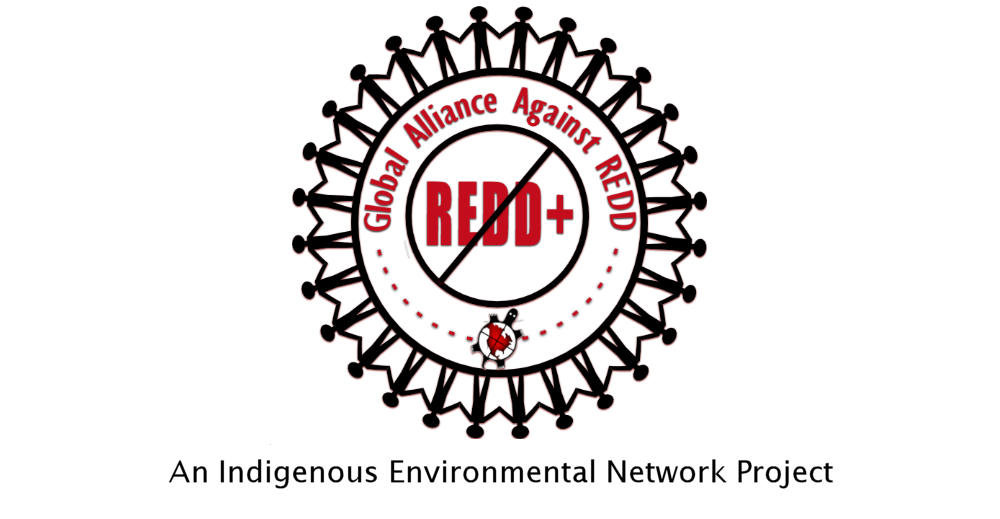Print the: No REDD Rice Manifesto: No WTO! No REDD! No to using Rice for Carbon Markets! w/o signatory. (PDF)
No REDD Rice Signatories (PDF)
Published: 04 December 2013
December 6, 2013 ● Bali, Indonesia
We, the undersigned Indigenous Peoples, peasants, fisherfolks, immigrants, women, youth, cooks and civil society of the world gathered in Bali to protest the WTO, know that rice is a sacred staple crop which feeds billions of peoples worldwide. We, who courageously resist efforts to impose the use of genetically modified so-called “Golden Rice” of Monsanto, now unite to defend rice from being used as a part of capitalism of nature and carbon markets – “REDD Rice”.
Since 2007, the United Nations, World Bank and fossil fuel polluters like Shell and Chevron and mining company Rio Tinto, have been pushing a carbon trading regime called REDD1 (Reducing Emissions from Deforestation and Degradation). REDD uses agricultural land, soils, forests and tree plantations as sponges for greenhouse gas emissions. Now these climate polluters want to use rice as an offset for their pollution instead of reducing emissions at source. Market-based solutions for addressing the climate crisis are a false solution.
We do not want our rice paddies or rice beds to be excuses for more pollution which causes global warming and typhoons. For peasant farmers, REDD+ constitutes a worldwide counter-agrarian reform and perverts the task of growing food into “farming carbon.” The UN and northern industrialized countries have introduced other false solutions to climate change such as “Climate-Smart Agriculture”. In Africa, where climate-smart carbon credit projects are being promoted, peasant farmers are starting to resist the use of their lands and soil for carbon sequestration, which is a carbon market scheme of capitalism. These new soil carbon markets are opening the door for more GMO crops and land grabs.
“Climate-ready” seeds and other supposed GMO climate fixes like “REDD Rice” are just more attempts of the biotech industry and agribusiness to deform, patent and control our seeds, grab our fields, privatize our soils and turn us into landless, indentured servants of capitalism.
Slated for next spring 2014, California may include rice cultivation as carbon offsets in its climate change law known as California’s Global Warming Solutions Act (AB32). The proposed rice cultivation offset protocol will pretend to reduce emissions through a cropland agricultural protocol using for the first time, a BIO- GEO-CHEMICAL model, which supposedly “emulates” soil processes. One of the methods for supposedly cutting emissions is to replace wet seedlings with dry seedlings. This will include growing GMO rice and the use of genetically modified “soil nutrients”.
China and California would be working with biotechnology companies that would privatize, patent and sell genes that supposedly allow rice plants to use less fertilizer. As part of economic globalization, this gene-knowledge and rice offsets would be sold to the highest bidder to meet their emissions reduction targets on the emerging global market for carbon credits.
If applied on a massive scale, genetically modified REDD Rice could contaminate rice farmers’ lands and seeds with enormous adverse environmental, social and cultural consequences.
· No to Privatization and Commodification of Rice!
· No WTO of our RICE!
· No WTO of Nature, Food and Life!
· NO REDD Rice!
Honoring our martyrs who have fallen for defending our land and territories, we commit to defend rice as Life and part of our movement for food sovereignty. We oppose using rice as part of the carbon market. We oppose the corporate genetic manipulation of our rice. We oppose the Green “Greed” Economy being pushed by the WTO that privatizes Nature as “environmental goods and services”. Defend our Mother Earth and say NO! to the trading of Life and the air that we breathe and the food that we eat.
____
1 REDD is a global initiative to create a financial value for the carbon stored in forests to compensate governments and companies or owners of forests in developing countries not to cut their carbon-rich forests or to reduce their rate of deforestation and forest degradation as a market mechanism to avoid GHG emissions. REDD+ (plus) expands REDD to develop methods for carbon sequestration through forest, wetlands, agricultural systems, soil, carbon stocks, “sustainable management of forests” (logging) and “enhancement of forest carbon stocks” in developing countries.

